
the Region 2000 Services Authority landfill in Campbell County is projected to accept waste until 2029
Source: Region 2000 Services Authority, Landfill Master Plan - Livestock Road Facility

the Region 2000 Services Authority landfill in Campbell County is projected to accept waste until 2029
Source: Region 2000 Services Authority, Landfill Master Plan - Livestock Road Facility
Most local jurisdictions that still operate landfills have combined with neighbors to share costs and provide an adequate amount of waste to pay for operations, expansion, and closure that will meet Department of Environmental Quality regulations.
The Region 2000 Regional Commission identified in 2002 the benefits for several jurisdictions to create a regional landfill, compared to creating a network of waste transfer stations to ship waste to a facility in a different jurisdiction or to build a regional waste-to-energy incinerator. Though Nelson County was not part of Region 2000, it joined in the study. It had only a waste transfer station, and no landfill to receive its municipal solid waste.
At the time, there were six operating landfills in the Regional 2000 Regional Commission jurisdictions - the counties of Amherst, Bedford, Campbell, Appomattox, and the cities of Lynchburg and Bedford.1
Bedford County, with its own landfill, declined to join the project. Amherst County also decided to keep operating its own separate landfill, with access limited to just county customers:2
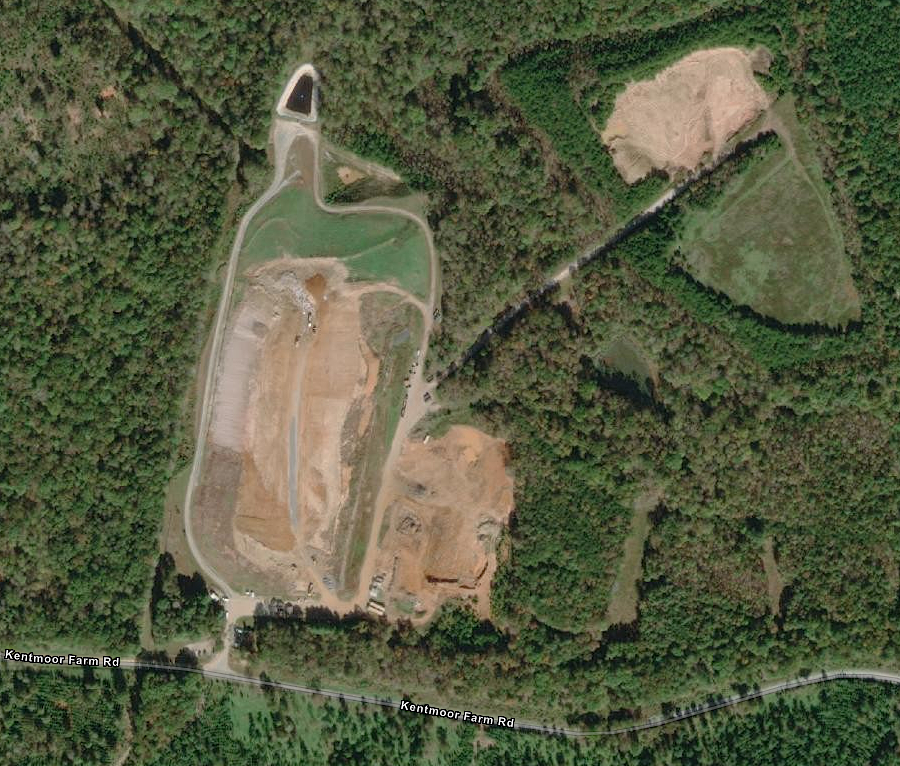
the Amherst County landfill accepts municipal solid waste only from Amherst County residents and businesses
Source: ESRI, ArcGIS Online
Campbell County, Appomattox County, the City of Lynchburg, the City of Bedford, and Nelson County partnered to create the Region 2000 Services Authority in 2008. The City of Bedford agreed to alter operations at its landfill, and accept only construction and demolition debris. Lynchburg and Campbell County agreed to transfer their landfills to the new regional authority. When the City of Bedford reverted to town status in 2013, however, it withdrew from the Region 2000 Services Authority and began using the Bedford County landfill.
The four jurisdictions sent their municipal solid waste to the City of Lynchburg landfill on Concord Turnpike initially, and most operations were suspended at the Campbell County landfill. The city's landfill on Concord Turnpike, which opened in 2008, was completely filled by July 2014. It was closed according to Virginia Department of Environmental Quality (DEQ) regulations. The Concord Turnpike Convenience Center site still serves as a waste transfer station.
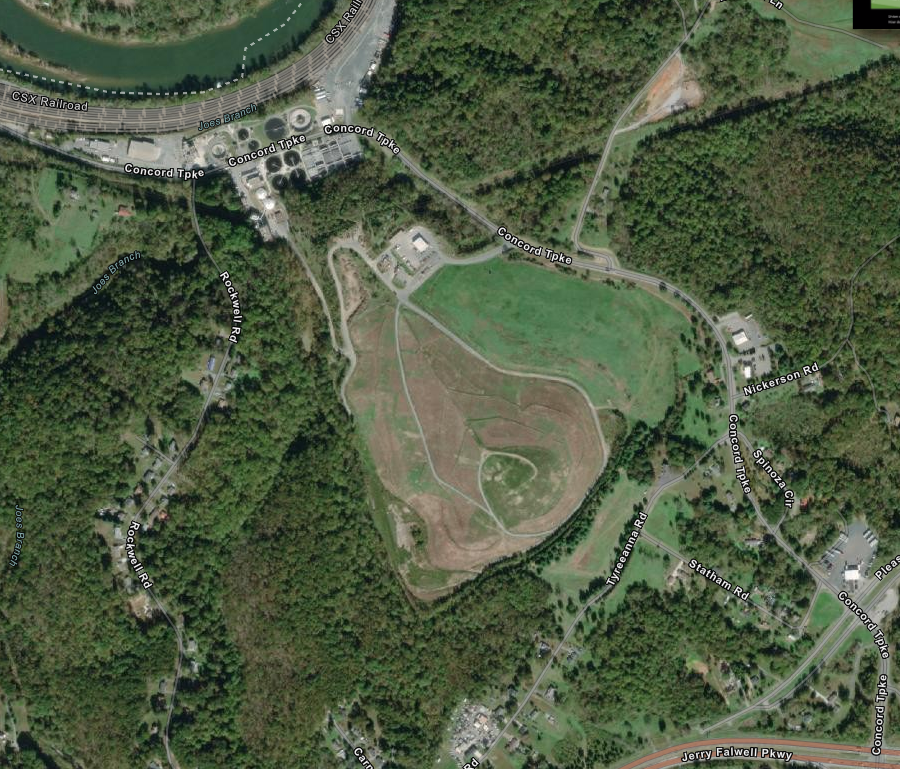
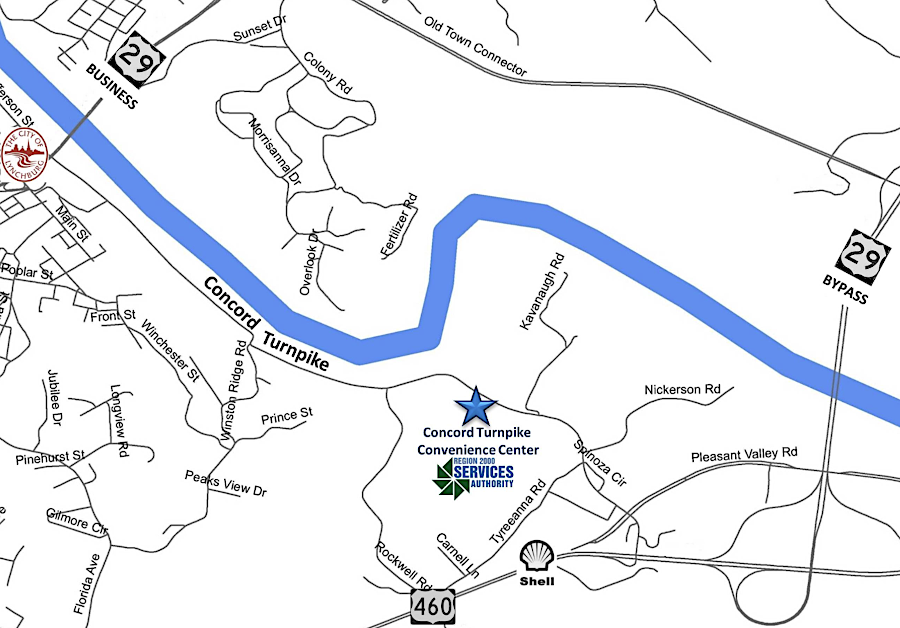
the Lynchburg landfill on Concord Turnpike closed in 2014 and serves now as the Concord Turnpike Convenience Center
Source: ESRI, ArcGIS Online; Region2000 Services Authority, Two Convenient Locations
The landfill in Campbell County was re-opened after the landfill on Concord Turnpike was closed. In 2015, the Region 2000 Services Authority got approval to expand that landfill.
Without expansion, capacity would have been exhausted in 2022. Opening a new facility was not expected to be feasible until 2025. A short-term measure was a lateral expansion of the existing landfill, adding six more acres of capacity within the existing footprint. Neighbors objected to continued exposure to odor in particular. The Region 2000 Services Authority started to extract and burn methane from the landfill and altered the pH of sludge deposited from the Lynchburg Wastewater Plant.
The lateral expansion in 2015 provided capacity until 2030. The Region 2000 Services Authority recognized it needed to start planning for a replacement landfill, to avoid repeating the pressures in 2015 to act quickly because there was no time for alternatives to the lateral expansion.3
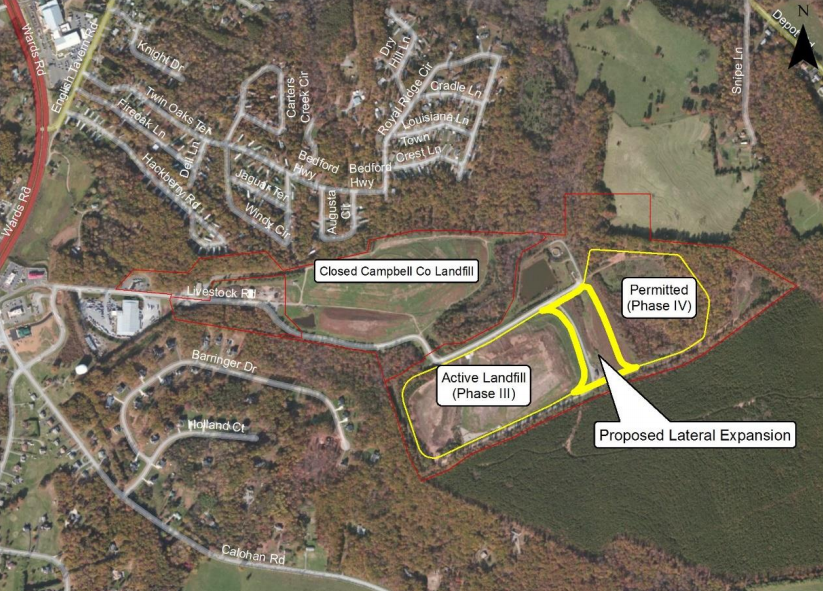
the 2015 lateral expansion extended the life of the Campbell County landfill from 2022 to 2030
Source: Region 2000 Services Authority, Landfill Master Plan - Livestock Road Facility
In 2018, the Region 2000 Services Authority determined that the most most-effective solution for managing municipal solid waste for its member jurisdictions beyond 2030 was to expand the landfill. Plans to acquire property adjacent to the facility and build new cells were blocked when Campbell County supervisors rejected the proposal. That left the regional authority with the option of building transfer stations and shipping solid waste to other landfills.
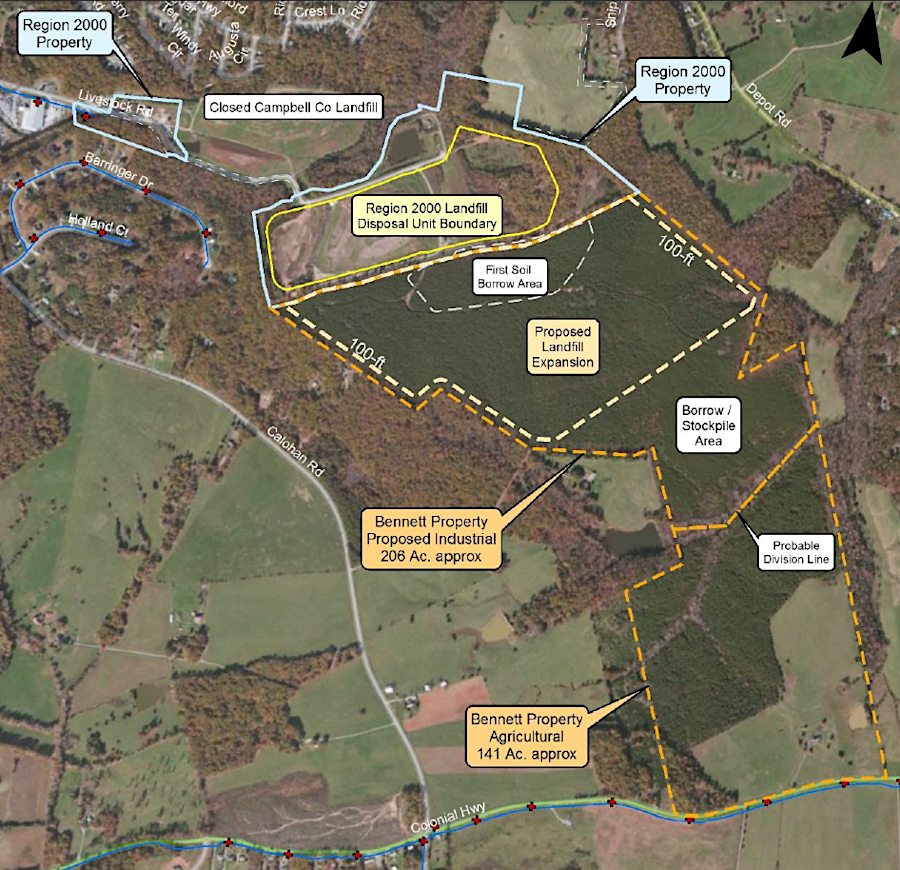
Campbell County supervisors blocked expansion of the landfill used by the Region 2000 Services Authority beyond the lateral extension in 2018, threatening closure of the facility in 2030
Source: Region 2000 Services Authority, Landfill Master Plan - Livestock Road Facility
Appomattox County started that transition in 2020, even though it remained a member of the Region 2000 Services Authority. The county authorized a waste transfer station and contracted for trash removal with the company proposing the Green Ridge Recycling and Disposal Facility. Amherst County also explored whether to add a cell to its landfill and keep it in business for another 30 years, or export its waste. Bedford County, including the Town of Bedford, was forced to switch to trash transfer stations and shipping waste to landfills outside the county after an engineering miscalculation required it to close the county landfill five years earlier than planned.
Hauling garbage is expensive. Tipping fees for disposal at the existing, centrally-located municipal landfills were less expensive than costs for transporting trash to mega-landfills in the region. Transfer was attractive politically because the long-term costs to operate landfills might end up more expensive for the counties and cities, financial risk could be transferred away from municipal jurisdictions, and the political risk of opening a dump" near a community of voters could be avoided.4
As the potential for the Region 2000 Services Authority to stop collecting trash in 2030 became clear, the members fought over the existing funding formula. Commercial trash haulers paid an extra $10/ton to dump their waste at the landfill, and until 2019 the additional funding was distributed to Lynchburg and Campbell County. That funding was treated as compensation for the "airspace" used in the landfills built by the two jurisdictions. In 1019, Appomattox and Nelson counties refused to allocate that funding, arguing that Lynchburg and Campbell County had already been adequately compensated.
By 2020, the authority had stockpiled an extra $2.5 million, and the four members agreed to a lawsuit in which the Region 2000 Services Authority would take no official position. They decided to allow a state judge to determine how to interpret the term "excess revenue" in the agreement that created the Region 2000 Services Authority.5
After negotiations, the members of the Region 2000 Services Authority agreed that Appomattox and Nelson counties would leave the regional partnership, and the withheld $6 million in revenue would be transferred to Campbell County for serving as the host of the landfill. Lynchburg and Campbell County stayed as partners and sought to expand the existing Region 2000 landfill near Rustburg, extending its life by 24 more years.
At the start of 2025, expansion was estimated to cost the Region 2000 Services Authority $3.5 million over the next 24 years, since tipping fees would cover $29 million of the $32.5 million total costs for the next 24 years. Costs for the alternative, building a waste transfer station and paying to use a landfill elsewhere, were projected to be $57-82 million. Expansion was not expected to increase truck traffic or create a taller feature on the landscape. A contractor designing the expansion said:6
Neighbors objected to the expansion. They noted that the area was just five miles from Liberty University and was prime land for new development. Previous complaints about odor issues had led to installation of a gas control and collection system in 2016. On January 7, 2025 the Campbell County Board of Supervisors rejected the rezoning and special use permit application for the planned expansion. A Rustburg resident said:7
Another Campbell County resident emphasized the perspective that hosting the regional landfill was not benefitting Campbell County:8
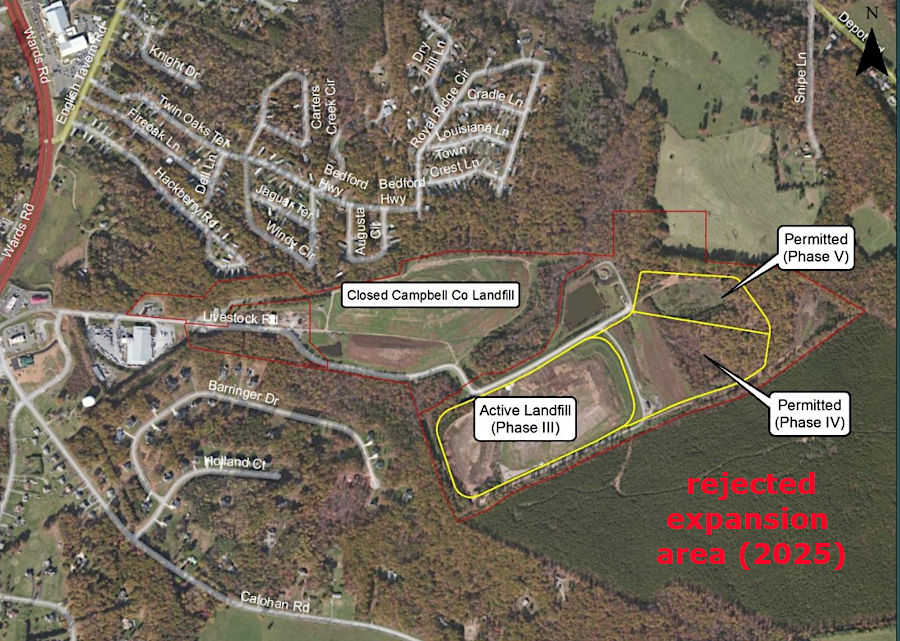
Campbell County officials approved expanding the Region 2000 landfill in 2014, but rejected further expansion in 2025
Source: Region 2000 Services Authority, Landfill Master Planning: Lovestock Road Facility (2014)
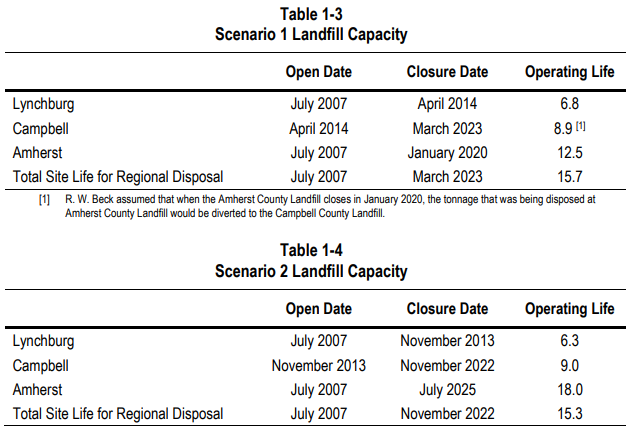
before deciding not to join the Regional 2000 Services Authority, in 2006 Amherst County considered opening its landfill to Nelson County trash in Option 1 and accepting just Amherst County trash in Option 2
Source: Region 2000 Regional Commission, Alternative Landfill Evaluation